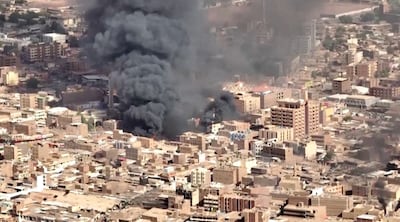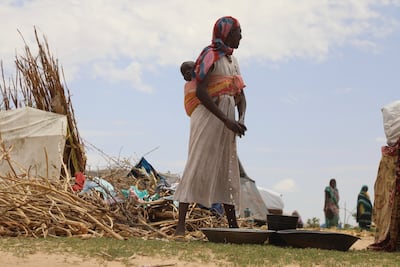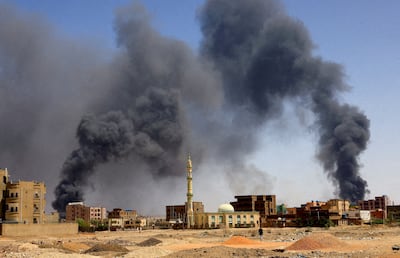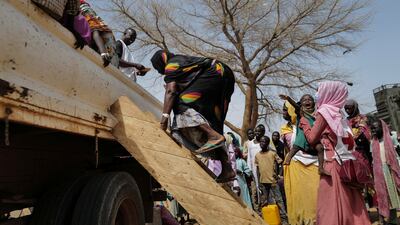In the 100 days since war broke out in Sudan, thousands have been killed and many more wounded.
The conflict is the first full-fledged war to be fought in the Sudanese capital since the late 19th century when a British-led, Anglo-Egyptian expedition toppled the Mahdist state and ushered in more than six decades of foreign occupation.
The war, which broke out in mid-April, created a massive humanitarian crisis with more than three million people fleeing their homes and others trapped by the fighting in the capital.
They are enduring lengthy and frequent power cuts and water shortages as well as scarce healthcare services. Looting is widespread.
The UN says 25 million people – more than half Sudan’s population – need food and 13.6 million children are in desperate need of humanitarian aid.

The war, meanwhile, seems to be immune to foreign mediation. A string of ceasefires brokered by the US and Saudi Arabia in indirect negotiations in Jeddah have been ignored or not fully respected by the army and the Rapid Support Forces. Sudan's army-aligned Foreign Ministry says representatives of the two sides were back in Jeddah but negotiations have not “seriously resumed”.
Here’s a look at where the war stands by location 100 days after it began.
Khartoum
The Sudanese capital has borne the brunt of the fighting between the army and the rival paramilitary RSF.
Large swathes of the city have been destroyed by the war, with both sides using heavy weapons, including fighter jets, artillery, tanks, rocket launchers and heavy machineguns.
Fighting in the capital – a sprawling metropolis comprising three cities built around the confluence of the White and Blue Niles, Khartoum, Omdurman and Bahri – is the most intense in areas housing major state or military installations.
These include the state radio and television studios in Omdurman, the headquarters of the armour corps in southern Khartoum and the strategically located Sharq Al Nile area in Bahri across the river where the RSF has several bases.
RSF fighters have entrenched themselves in residential areas, where they mostly survive on food looted from supermarkets and homes left empty by occupants who fled the fighting. The abandoned homes have also been used as sleeping and operational centres for RSF units.

In some residential neighbourhoods, RSF fighters have over the past week evicted occupants of entire blocks of homes. The evictions mostly took place when civilians refused to co-operate or engaged in gunfights in defence of their property.
The entrenchment of RSF fighters has been tough to break by army troops keen on minimising their casualties and relying heavily on artillery and air strikes, both ineffective in dislodging them.
Significantly, the army has been unable to take back control of any of the key Khartoum sites captured by the RSF during the war’s early days, like the Nile-side presidential palace, Khartoum International Airport and large sections of the armed forces’ headquarters near the city centre.
The army has, however, successfully defended its bases against persistent RSF attacks.
The army-held airbase of Wadi Sayedna west of Omdurman has come under attack by the RSF, repelled by troops. Omdurman is also home to eight military bases, of which the headquarters of the engineering corps is the most important given the large number of weapons stored there.
Darfur
The troubled western region of Darfur has seen horrific violence since war broke out, mostly genocidal attacks by the RSF and allied Arab militiamen against members of ethnic African tribes. The attacks left hundreds killed and entire villages looted and torched. The violence, which forced tens of thousands to flee to neighbouring Chad, has been centred in Al Geneina and Misterei in west Darfur.
It’s a repeat of the never resolved civil war that ravaged Darfur in the 2000s, when the government and the Janjaweed, the RSF’s notorious forerunner, joined forces to crush a revolt by ethnic Africans seeking an end to discrimination by Sudan’s Arab and Muslim north.

The violence in Darfur has led the International Criminal Court to open an investigation into possible war crimes there by the RSF and its allies.
More than a decade ago, the ICC indicted former dictator Omar Al Bashir and several of his top aides for crimes against humanity, war crimes and genocide in Darfur. The Janjaweed remains accused of committing war crimes against civilians there.
Now, the RSF is in virtual control of the entire region, with army troops stationed in the area staying inside their bases, leaving the local ethnic African population to fend for itself.
Kordofan
Like Darfur, south Kordofan has for decades been mired in violence and unrest.
The rebel Sudan People’s Liberation Movement-North led by Abdel Aziz Al Helou attacked army bases there last month and sought to take advantage of the security vacuum created by the war to expand territory already under its control.
The fighting there took place in the towns of Kadugli and Al Dalanj.

The army at the time said it had fought back against the attackers but sustained unspecified losses. The SPLM-N’s attacks, it claimed, violated a long-standing ceasefire between the two sides.
There was also some violence in northern Kordofan earlier this month, when residents reported army artillery shelling RSF bases in the city of Al Obeid. The shelling never escalated into a full-fledged fight.
Northern Sudan
The RSF briefly captured the military base at Marawi at the start of the war, when it seized and later released scores of Egyptian soldiers Cairo said were there as part of joint war games with Sudanese forces. The army recaptured the base within days but not before RSF fighters destroyed several aircraft sitting on the tarmac.
There has been no reports of fighting there since.

